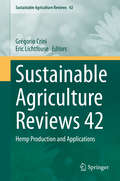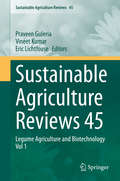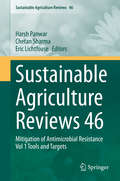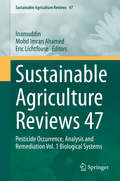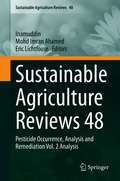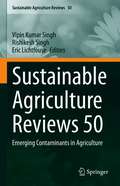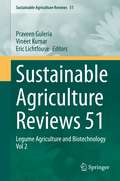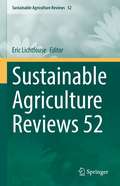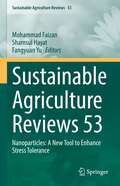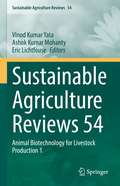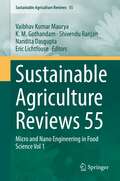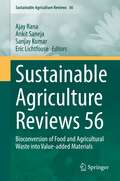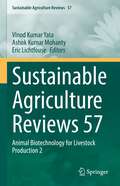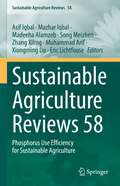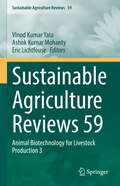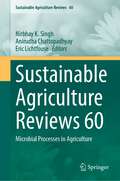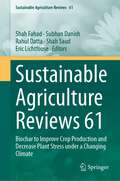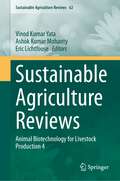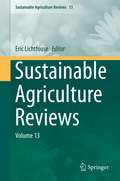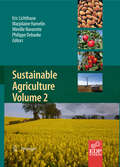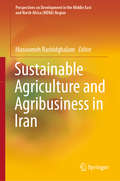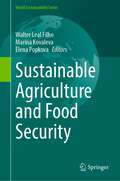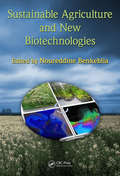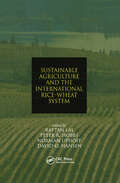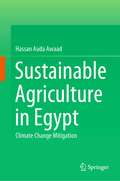- Table View
- List View
Sustainable Agriculture Reviews 42: Hemp Production and Applications (Sustainable Agriculture Reviews #42)
by Eric Lichtfouse Grégorio CriniThis book reviews recent research and applications, developments, research trends, methods and issues related to the applications of industrial hemp for fundamental research and technology.
Sustainable Agriculture Reviews 45: Legume Agriculture and Biotechnology Vol 1 (Sustainable Agriculture Reviews #45)
by Eric Lichtfouse Vineet Kumar Praveen GuleriaLegumes are a major constituent of vegetarian diets and alleviate malnutrition because they are protein-rich and easily digestible. Moreover, a legume-based diet is much more sustainable than a meat-based diet. Recent research has disclosed major advances in legume agriculture and biotechnology, leading to improved health benefits from nutrients, antioxidants, polyphenolic phytochemicals, phenolic acids, flavonoids and tannins. This book reviews bioactive compounds and their applications, and conventional breeding and biotechnology for legume sustainability and nutritional enhancement.
Sustainable Agriculture Reviews 46: Mitigation of Antimicrobial Resistance Vol 1 Tools and Targets (Sustainable Agriculture Reviews #46)
by Eric Lichtfouse Chetan Sharma Harsh PanwarAccording to the World Health Organization, antimicrobial resistance is a major threat to global health because the number of alternative antibiotics is very limited. Antimicrobial resistance is a slow evolutionary process that has been accelerated by human activities in health, environment and agriculture sectors. Due to their wide application, antibiotics and their residues have been found in almost all food products and natural ecosystems. This book reviews the drivers, impact and mitigation of antimicrobial resistance, with focus on methods and targets.
Sustainable Agriculture Reviews 47: Pesticide Occurrence, Analysis and Remediation Vol. 1 Biological Systems (Sustainable Agriculture Reviews #47)
by Eric Lichtfouse Inamuddin Mohd Imran AhamedThis book presents recent reviews on the occurrence, analysis, toxicity and remediation of pesticides in biological systems such as fish, chickens, water, soil and food.
Sustainable Agriculture Reviews 48: Pesticide Occurrence, Analysis and Remediation Vol. 2 Analysis (Sustainable Agriculture Reviews #48)
by Eric Lichtfouse Inamuddin Mohd Imran AhamedThis book reviews advanced techniques for the determination of pesticide residues, with focus on extraction, detectors and cleaning protocols. Chapters also discuss pesticide occurrence, toxicity and remediation.
Sustainable Agriculture Reviews 50: Emerging Contaminants in Agriculture (Sustainable Agriculture Reviews #50)
by Eric Lichtfouse Rishikesh Singh Vipin Kumar SinghThis book reviews contaminants of emerging nature affecting the agroecosystem and includes important information regarding the their sources, types, transportation, environmental threats and strategies to decontaminate the affected agroecosystems. The contents of this volume will help the policy makers and environmental engineers in combating the continuously rising threats to cultivated ecosystems.
Sustainable Agriculture Reviews 51: Legume Agriculture and Biotechnology Vol 2 (Sustainable Agriculture Reviews #51)
by Eric Lichtfouse Vineet Kumar Praveen GuleriaIn the context of climate change, pollution and food safety, the current challenge is to enhance legumes production to sustain the growing population needs by 2050. This is a daunting task because abiotic and biotic stresses are threatening the growth, survival and productivity of legumes. For instance, the productivity of legumes is documented to be reduced by 14-88% by abiotic stresses. The co-occurrence of abiotic and biotic stresses under field conditions leads to interactive stress types, thus yielding positive or negative outcomes. Legumes react using antioxidant defense, osmoregulatory adjustments, hormonal regulations and molecular mechanisms to tolerate stress. Hence, improving legume productivity requires knowledge on the sensitivity, mechanisms and approaches of stress tolerance in legumes, in order to design new crops and alternative management systems. This book presents advances on bioactive compounds, applications, effect of various stresses and biotechnology-based stress tolerance mechanisms of legumes. This is our second volume on Legume Agriculture and Biotechnology, published in the series Sustainable Agriculture Reviews.
Sustainable Agriculture Reviews 52 (Sustainable Agriculture Reviews #52)
by Eric LichtfouseThis book presents advanced knowledge and techniques to improve food quality, such as organic farming, fertilization using waste, reducing arsenic in food, soil restoration, forage production in arid regions and weed control. Agriculture is actually facing two major challenges, feeding an ever-growing population and providing safe food in the context of pollution, climate change and the future circular economy.
Sustainable Agriculture Reviews 53: Nanoparticles: A New Tool to Enhance Stress Tolerance (Sustainable Agriculture Reviews #53)
by Shamsul Hayat Mohammad Faizan Fangyuan YuThis book presents recent developments involving the role of nanoparticles on stress tolerance. In particular, nanoparticles have the potential to provide effective solutions to the multiple agriculture-related problems. Nanoparticles present enhanced reactivity and thus better effectiveness when compared to their bulkier counterparts due to their higher surface-to-volume ratio.
Sustainable Agriculture Reviews 54: Animal Biotechnology for Livestock Production 1 (Sustainable Agriculture Reviews #54)
by Ashok Kumar Mohanty Eric Lichtfouse Vinod Kumar YataThis book reviews concepts and recent advances of biotechnological approaches for livestock production. Indeed, biotechnologies have recently emerged as powerful tools for animal breeding, genetics, production, nutrition, and animal health. Applications to the production of livestock such as cattle, camel, and poultry are detailed. Chapters also present biotechnological applications for diagnostics, animal nutrition, and animal food production.
Sustainable Agriculture Reviews 55: Micro and Nano Engineering in Food Science Vol 1 (Sustainable Agriculture Reviews #55)
by Eric Lichtfouse Shivendu Ranjan Nandita Dasgupta K. M. Gothandam Vaibhav Kumar MauryaThis book provides up to date information on the emerging trends and technology in food nanotechnology. It gives high-quality literature focused on the recent developments, research trends, methods and issues related to the safe use of nanoscale materials to add value to food. Most importantly, this book encloses critical reviews on micro and nanoengineering concepts, principles and applications in food. It also provides a scientific basis of micro and nanoengineered structures and compounds, their industrial food applications, encapsulation techniques and methods. This book encompasses detection, analysis and characterization techniques for nanostructures, the fate of encapsulated materials in target food. It also educates on regulatory issues and safety of clinical translation of nanomaterials in fortified foods.
Sustainable Agriculture Reviews 56: Bioconversion of Food and Agricultural Waste into Value-added Materials (Sustainable Agriculture Reviews #56)
by Eric Lichtfouse Sanjay Kumar Ankit Saneja Ajay RanaThis book reviews the sources, extraction, processing and applications of value-added compounds from agro-waste, with a focus on drug delivery, tea, apple pomace, lignin nanocomposites, bioethanol, fertilizers and sitosterol. Food residues provide bioactive molecules, enzymes, vitamins, antioxidants, and animal feed.
Sustainable Agriculture Reviews 57: Animal Biotechnology for Livestock Production 2 (Sustainable Agriculture Reviews #57)
by Ashok Kumar Mohanty Eric Lichtfouse Vinod Kumar YataThis 2nd book provides fundamental concepts and recent applications of biotechnological methods, such as genetic selection, breeding methods and genetic engineering tools. Biotechnology has remarkably improved the productivity of livestock by increasing the reproduction efficiency and decreasing the generation time. The chapters detail the mechanisms of methods for animal reproduction and breeding methods. This book focus on the impact of minerals, steroids metabolic stress, nutritional stress and anti-nutritional factors on the livestock reproduction.
Sustainable Agriculture Reviews 58: Phosphorus Use Efficiency for Sustainable Agriculture (Sustainable Agriculture Reviews #58)
by Eric Lichtfouse Muhammad Arif Asif Iqbal Mazhar Iqbal Madeeha Alamzeb Song Meizhen Zhang Xiling Xiongming DuThis book presents recently-developed crop, soil, and management practices that can be used to improve phosphorous use efficiency in agriculture. Food security highly depends on the availability of plant nutrients such as phosphorus, yet rock phosphate reserves are expected to be exhausted in the next 50–100 years. Moreover, about 80% of the phosphorous fertilizers applied to soils become unavailable to plants due to phosphorous fixation in iron and aluminum oxides in acidic soils and with carbonates in alkaline soils. As a consequence, only 10-15% of applied phosphorous is up taken by crops. Therefore, there is a need for advanced practices for improving phosphorus use efficiency.
Sustainable Agriculture Reviews 59: Animal Biotechnology for Livestock Production 3 (Sustainable Agriculture Reviews #59)
by Ashok Kumar Mohanty Eric Lichtfouse Vinod Kumar YataThe dependency on animal biotechnology in livestock industries has been increased in the recent past. The livestock production research has witnessed remarkable developments on biotechnological methods to produce the elite animal breeds. The global animal food requirement has been steadily increasing, and animal production needs to be increased as per the global needs. This book covers various aspects of animal biotechnology such as, reproductive biotechnologies in sheep and goats, oogenesis and folliculogenesis and ovarian disorders. This book focusses the discussion on proteomics and metabolomics, and separate chapters were dedicated to discuss these topics. The proteomics studies of animal viruses were discussed in this book, and this would be helpful to understand animal viral pathogenesis. The applications of metabolomics in livestock were discussed with focus on data analysis, identification of unknown compounds. The purpose of this book is to provide the recent research trends, and convert all this information to usable guide to professionals, researchers and students who are working the research area of animal biotechnology.
Sustainable Agriculture Reviews 60: Microbial Processes in Agriculture (Sustainable Agriculture Reviews #60)
by Eric Lichtfouse Nirbhay K. Singh Anirudha ChattopadhyayIn the context of rising adverse effects of climate change on agriculture, there is a need for advanced methods and practices to manage soils for production of food and energy. This book presents the latest advances in microbial processes that control plant growth, with focus on genomic tools, microbial interactions with the plant and soils habitats, mobilization of plant nutrients, agricultural waste management, biodegradation, bioremediation, carbon sequestration, land reclamation, plant growth promotion, suppression of plant pathogens, induced systemic resistance and tolerance against biotic and abiotic stresses.
Sustainable Agriculture Reviews 61: Biochar to Improve Crop Production and Decrease Plant Stress under a Changing Climate (Sustainable Agriculture Reviews #61)
by Eric Lichtfouse Rahul Datta Shah Fahad Shah Saud Subhan DanishThe book aim to contribute the latest understandings of physiological, biochemical and molecular bases of the responses of major crop plants to a range of different biomass produced biochar to introduce climate resilience crop varieties which leads to enhanced crop productivity and quality under stressful conditions and also for better utilization of natural resources to ensure food security through modern breeding. Finally, this book will be a valuable resource for future plant stress related research with biochar, and can be considered as a reference book for front-line researchers working on sustaining crop production under climate change.Adverse effects of climate changes on crops has developed the situation quite critical for sustainable agriculture. Food security has become in danger due to low production of agricultural crops by resilient climate and ever increasing human population. Heat, drought, salinity, soil compaction, flooding and poor soil organic carbon induced stress in crops by climate adverse conditions are major concerns in this regard. A mechanistic understanding of the interactions between abiotic stresses response of crops is needed to identify and take advantage of acclimation traits in major crop species as a prerequisite for securing robust yield and good quality. This underpins a need for crops with inherent yield increase, yield stability against multiple abiotic stresses and improved quality. Individual stress tolerance mechanisms have been well documented so far. However, mechanisms behind plants’ tolerance by application of biochar and its interactions with soil and plant roots towards multiple abiotic stresses are not fully understood. In addition, there will always be some uncertainty associated with modelling the complex relationships between agricultural yields, product quality with biochar under future climate scenarios. Prediction of yield and quality stability, one of most complex agronomic traits, must integrate aspects of plant development, physiology, biochemistry and genetics. Furthermore, the GxExM interactions will complicate the model predications, thus the responses of a given genotype to a defined environment under certain management strategy need to be determined empirically and used to parameterise and refine crop models.
Sustainable Agriculture Reviews: Animal Biotechnology for Livestock Production 4 (Sustainable Agriculture Reviews #62)
by Ashok Kumar Mohanty Eric Lichtfouse Vinod Kumar YataThis book presents advanced reviews on latest developments and future trends of animal biotechnology with focus on computational and experimental approaches. The articles in this book discusses the implications of recent methods in animal biotechnology to improve the livestock production. Applications of omics technologies and system biology approaches for livestock production and animal disorders were discussed in detail. The evolution of transgenic technology, genome editing and markers for early pregnancy detection were elucidated in this book. A couple of chapters were dedicated to understanding the role of gut microbiome, probiotics and prebiotics on livestock health and production. The nanomaterials have been shown been shown beneficial effects in biological applications. This book also discussed the veterinary applications of nanomaterials. The articles of this book provide state of the art information that is appropriate to academicians, researchers and students who are involved in the animal biotechnology research.
Sustainable Agriculture Reviews: Volume 13
by Eric LichtfouseSustainable agriculture is a rapidly growing field aiming at producing food and energy in a sustainable way for humans and their children. It is a discipline that addresses current issues: climate change, increasing food and fuel prices, poor-nation starvation, rich-nation obesity, water pollution, soil erosion, fertility loss, pest control and biodiversity depletion. This series gathers review articles that analyze current agricultural issues and knowledge, then proposes alternative solutions.
Sustainable Agriculture Volume 2
by Eric Lichtfouse Marjolaine Hamelin Mireille Navarrete Philippe DebaekeThis book gathers review articles that analyze current agricultural issues and knowledge, then propose alternative solutions. It will therefore help all scientists, decision-makers, professors, farmers and politicians who wish to build a safe agriculture, energy and food system for future generations.
Sustainable Agriculture and Agribusiness in Iran (Perspectives on Development in the Middle East and North Africa (MENA) Region)
by Masoomeh RashidghalamThis book presents a collection of ten empirical studies on Iran’s sustainable agriculture and agribusiness, grouped into three domains: agricultural prices and commodity market analysis; risk management and climate change; and natural resources and environmental economics. The various studies elaborate on sustainable agriculture, climate change, pest management, natural resources, land-use, agricultural marketing, risk management and insurance in Iran’s agricultural sector. The book also introduces the key microeconomic principles that are applied to agriculture from a suitability perspective, and provides policy recommendation to decision makers and agricultural-product producers. As such it serves as a supplement to textbooks on applied economics, agricultural and environmental economics, and offers students and professionals in agricultural economics, resource economics, risk management, and food policy as well as general economists real-world examples of the principles under discussion. Further, it includes an extensive range of case studies from different regions of the country, which could be applied in agricultural policy making process, making it a useful resource for agricultural planners and decision makers in government agencies.
Sustainable Agriculture and Food Security (World Sustainability Series)
by Walter Leal Filho Marina Kovaleva Elena PopkovaThis book describes initiatives and concrete examples on sustainable food production worldwide. In the current world scenario, where nations all over the world are struggling to accomplish the United Nations Sustainable Development Goals and to ensure sustainable patterns for all, this book provides a contribution towards a more comprehensive and interdisciplinary understanding of the cross-cutting issues related to Sustainable Agriculture and Food Security. This interdisciplinary book supports the efforts to engage a commitment from all fields of science, to work together to provide knowledge that could help to address SDG2 (No hunger) and lead to the promotion of quality of life, by means of a more sustainable food production, and improved food security. This book is expected to fill the gap of publications in this field. It gives a special emphasis to a state-of-the-art descriptions of approaches, methods, initiatives and projects from universities, stakeholders, organizations and civil society across the world, regarding cross-cutting issues in sustainable food production. It includes examples of policies and practices case studies, examples of projects, institutional policies, innovative methods and tools and research outputs, which highlight the interdependence between sustainable agriculture and food security issues. It is expected that the “Sustainable Agriculture and Food Security” will make the many benefits of sustainable food production clearer and, inter alia, lead to an increase in the emphasis provided to this central theme.
Sustainable Agriculture and New Biotechnologies
by Noureddine BenkebliaTaking a broad and innovative informational approach, Sustainable Agriculture and New Biotechnologies is the first book to apply omic technologies to address issues related to understanding and improving agricultural sustainability in the food production process. The transformation from industrial to sustainable agriculture is discussed within the
Sustainable Agriculture and the International Rice-Wheat System (Books In Soils, Plants, And The Environment Ser. #Vol. 103)
by Rattan Lal David O. Hansen Peter R. Hobbs Norman UphoffAddressing a topic of major importance to the maintenance of world food supplies, this reference identifies knowledge gaps, defines priorities, and formulates recommendations for the improvement of the rice-wheat farming system. The book reveals new systems of rice intensification and management and illustrates the application of no-till and conser
Sustainable Agriculture in Egypt: Climate Change Mitigation
by Hassan Auda AwaadThis book consists of 10 Chapters in 4 Parts. The first Part is an introduction and contains Chapter 1 to introduce the book chapters to the audiences. The second Part consists of two chapters under the name, Impact of Climate Change on Crop Production and the Physiological and Biochemical Basis for Crops Tolerance. The Chapter 2 focus on critical periods of crop plants to stress conditions and the expected impacts of climate changes mainly on the productivity and quality of field crops. While, Chapter 3 highlights the foundations of crop tolerance to environmental stress and plant traits relevant to stress tolerance. It is devoted to explain and discuss mechanisms of adaptation to environmental stress conditions and addresses various plant traits related to stress environmental tolerance i.e. phenological, morpho-physiological and biochemical traits which could be used as selection criteria for crops improvement. The third Part consists of 5 Chapters under the theme “Improve Crop Adaptability and Stability to Climate Change and Modern Technology". Chapter 4 highlights the most important strategic food grain crop (wheat), Chapter 5 focuses the important staple food crop (rice), while Chapter 6 deals with one of the most important food legume crops (faba bean). Chapter 7 and 8 discuss two important oil crops (sesame and sunflower). However, Chapter 9 focuses on cotton as one of the most important fiber crops. The author addresses these crops under the following headings: genotype x environment interaction and its relation to climatic change on yield production, performance of genotypes in response to environmental changes, adaptability and yield stability to environmental conditions, additive main effects and multiplicative interaction model, gene action, genetic behavior and heritability for traits related to environmental stress tolerance, role of recent approaches, biotechnology and nanotechnology. This is besides how can measure sensitivity of genotypes to environmental stress, and finally the appropriate agricultural practices to mitigate environmental stress on crops under attention. The book ends with Chapter No. 10 where the author presents an update of the book topics, present the most important conclusions and recommendations from all chapters.This book has been prepared and supported by recent references and statistics with coloured tables and illustrations for audiences interested in crop science,environment, plant breeding, genetics and biotechnology, as well as postgraduate students and researchers in universities and research centres.
